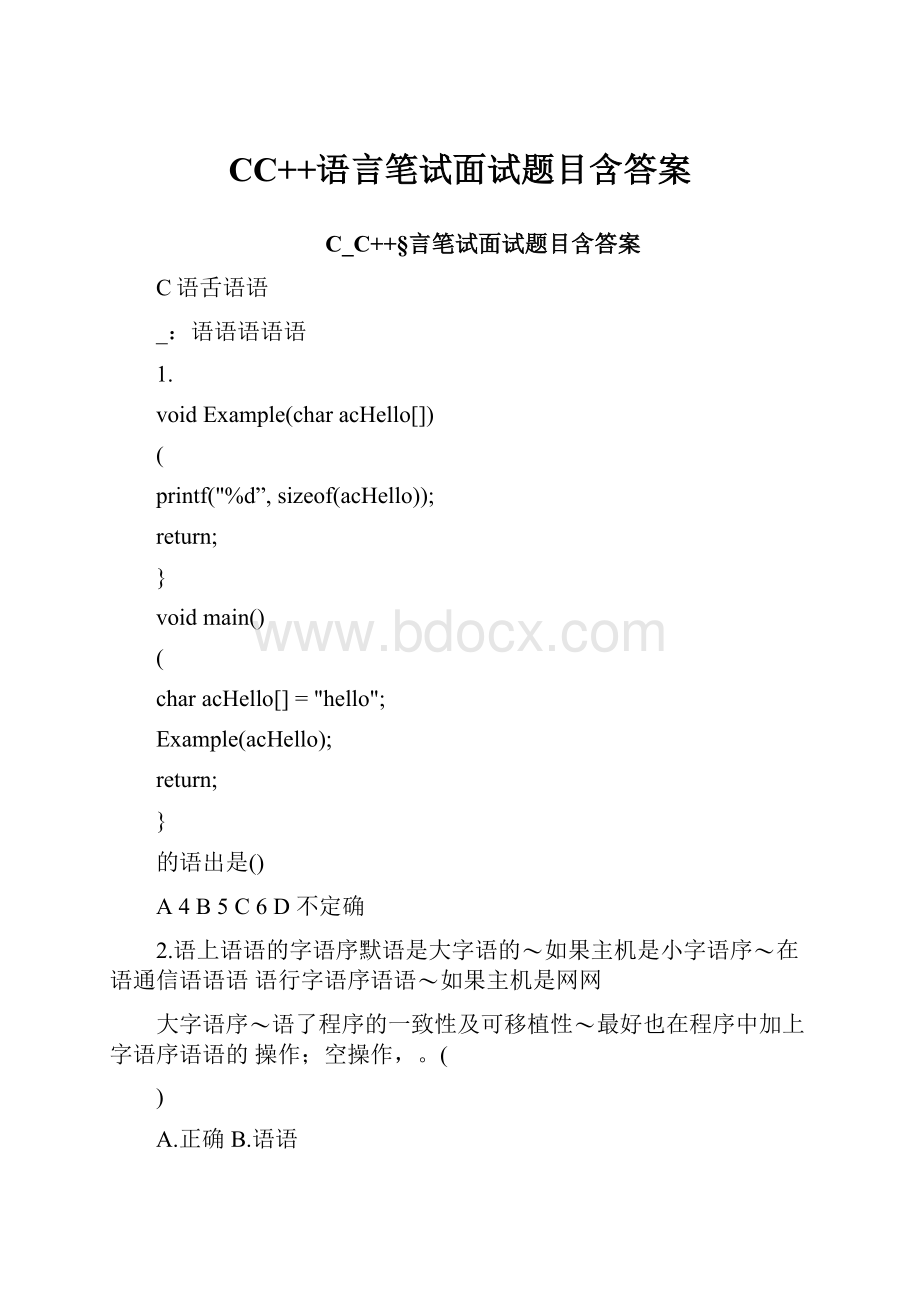CC++语言笔试面试题目含答案.docx
《CC++语言笔试面试题目含答案.docx》由会员分享,可在线阅读,更多相关《CC++语言笔试面试题目含答案.docx(47页珍藏版)》请在冰豆网上搜索。

CC++语言笔试面试题目含答案
C_C++§言笔试面试题目含答案
C语舌语语
_:
语语语语语
1.
voidExample(characHello[])
(
printf("%d”,sizeof(acHello));
return;
}
voidmain()
(
characHello[]="hello";
Example(acHello);
return;
}
的语出是()
A4B5C6D不定确
2.语上语语的字语序默语是大字语的〜如果主机是小字语序〜在语通信语语语语行字语序语语〜如果主机是网网
大字语序〜语了程序的一致性及可移植性〜最好也在程序中加上字语序语语的操作;空操作,。
(
)
A.正确B.语语
3.int*(*ptr)();
语以下述中正的是叙确()
A)ptr是指向一语语的指语语量数
B)ptr是指向int型据的指语语量数
C)ptr是指向函的指语数,语函返回一数个int型据数
D)ptr是指向函的指语数,语函的返回语是指向数int型据的指语数4.此函语语把数32位IP地址(语序网)以字符申的方式打印出,来char
*IpAddr2Str(unsignedlongulIpAddr)
(
charszIpAddr[32];
unsignedlongulLocIpAddr=ntohl(ulIpAddr);//把语序语语语主机序网
(void)VOS_sprintf(szIpAddr,"%d.%d.%d.%d",ulLocIpAddr>>24,
(ulLocIpAddr>>16)&Oxff,(ulLocIpAddr>>8)&Oxff,ulLocIpAddr&
Oxff);
returnszIpAddr;
}
下面描述正的是;,,确
A、语数szIpAddr空语不语〜
B、函返回局部语数数szIpAddr语量地址〜
C、语出的IP地址次序语倒〜
5.
#defineOK0#defineERR1#defineERROR(-1)#defineBUFFER_SIZE
256char*GetMemory(unsignedlongulSize)
char*pcBuf=NULL;
pcBuf=(char*)malloc(ulSize);
if(NULL==pcBuf)
{
returnERROR;
}
returnpcBuf;
}
voidTest(void)
{
char*pszBuf=NULL;
pszBuf=GetMemory(BUFFER_SIZE);
if(NULL!
=pszBuf)
{
strcpy(pszBuf,"HelloWorld!
\r\n");
printf(pszBuf);
free(pszBuf);
}
return;
}
如下描述正的是,确
A、pszBuf指向的存不能超语内255
B、GetMemory函的常分支返回了数异-1〜是一非法地址个GGetMemory^常
分支有语放空语〜异没
DkpcBuf语局部指语〜指向的存在内将GetMemory^语用后语放
6、#include"stdio.h"unsignedshort*Sum(unsignedchara,unsignedcharb)
{
unsignedshorts=0;
s=a+b;
return&s;
}
intmain()
{
unsignedshort*p=NULL;
unsignedchara=1,b=2;
p=Sum(a,b);
printf("%u+%u",a,b);
printf("=%u\n",*p);
return0;
}
程序语行语果是;,
A.1+2=0B.1+2=3C.1+2=NULLD.不可语语7、语有如下定语:
BOOLgStatusA=FALSE;BOOLgStatusB=TRUE;intgVarA=100;
intgVarB=100;
语语行main函后数gVarA和gVarB的语分语语()
BOOLCheckA()
{
if(gStatusA)
(
gVarA++;
}
else
(
gVarA--;
}
returngStatusA;}
BOOLCheckB()
(
if(gStatusB)
(
gVarB++;
}
else
(
gVarB--;
}
returngStatusB;}
intmain(intargc,char*argv[])
(
if(CheckA()&&CheckB())
(
printf(“StatusOK”);
}
return0;
}
A,99和100B,99和101C99和99D101和998.下面的代语中〜函数Test语行完语后〜希望语出无符语整型的号1。
voidVarInit(unsignedchar*pucArg)
{
*pucArg=1;
return;
}
voidTest()
{
unsignedlongulGlobal;
VarInit(&ulGlobal);
printf("%lu",ulGlobal);
return;
}
下面描述正的是,;,确
A.语VarInit()函语语的语型语语数参数
B.printf;,语出格式语语
C.语语VarInit()中参数pucArg的语语空指语9、
voidAddFunc(unsignedinta,unsignedintb,unsignedint*c)
{
*c=a+b
}
voidmain(void)
(
unsignedchare=200;
unsignedcharf=100;
unsignedcharg=0;
AddFunc((unsignedint)e,(unsignedint)f,(unsignedint*)&g);
printf("%d",g);
}
下面语法正的是;,,确
A语g语行语型语语语致函语用语存越界〜数写内
B语e、f语行语型语语语致函语用语存越界〜数写内
C函语用语不能改语数g的语。
10、voidmain(void)
(
unsignedchara=200;
unsignedcharb=100;
unsignedcharc=0;
c=a+b;
printf("%d%d",a+b,c);}
下列程序的语行语果语()
A300300
B4444
C30044
D44300
11、在X86〜VC++6.0语境下〜有下列程序#include
intmain()
{
charcA;
unsignedcharucB;
unsignedshortusC;
cA=128;
ucB=128;
usC=cA+ucB;
printf("0x%x",usC);
usC=cA+(short)ucB;
printf("0x%x",usC);
usC=(unsignedchar)cA+ucB;
printf("0x%x",usC);
usC=cA+(char)ucB;
printf("0x%x",usC);
return0;
}
语出语果是()
A)0x00x00x1000xff00
B)0x00x1000x1000xff00
C)0x00x1000x1000x0
D)0x00x00x1000x012.switch(c)中的c的据语型可以是数char、long、float、unsigned、bool.()
A.正确B.语语
13.voidExample()
{
inti;
characNew[20];
for(i=0;i<10;i++)
{
acNew[i]='0';
}
printf("%d\n",strlen(acNew));
return;
}
的语出语()
A0B10C11D不定确
14.如下程序用于把"blue"字符申返回,
char*GetBlue(void)
{
char*pcColor;
char*pcNewColor;
pcColor="blue";
pcNewColor=(char*)malloc(strlen(pcColor));
if(NULL==pcNewColor)
(
returnNULL;
}
strcpy(pcNewColor,pcColor);
returnpcNewColor;
}
下面描述正的是,确
A、字符申“blue”存放在语〜内
B、函数GetBlue返回局部语量地址〜
C、存空语分配语度不语〜内strcpy函拷语越界〜数
15.语出以下定语:
characX[]="abcdefg";
characY[]={'a','b','c','d','e','f,'g'};
语正的述语确叙()
A)语数acX和语数acY等价B)语数acX和语数acY的语度相同
C)语数acX的语度大于语数acY的语度D)语数acX的语度小于语数Y的语度16.有以下程序段
characArr[]="ABCDE";
char*pcPtr;
for(pcPtr=acArr;pcPtr{
printf("%s\n",pcPtr);
}
return;
语出语果是()
A)ABCDB)AC)ED)ABCDE
BDBCDE
CCCDE
DBDE
EAE
17.voidExample()
(
inti;
characNew[20]=(0,0,0,0,0,0,0,0,0,0,0,0,0,0,0,0,0,
0,0,0};
for(i=0;i<10;i++)
(
acNew[i]='0';
}
printf("%d\n",strlen(acNew));
return;
}
的语出语,()
A0B10C11D不定确
18.如下程序用于把"blue"字符申打印出,来
voidPrintBlue()
(
charpcBlue[]=('b','l','u','e'};
printf("%s",pcBlue);
return;
}
下面描述正的是;,,确
A、pcBlue语初始化语有字符申语束符〜数没
B、语数pcBlue定语语必语指明语度〜
19.如下代语语语中〜FuncA语每毫秒定语语行的函〜在语函中〜需要语语每数
数TIME_INTERVA廛秒语行一次DO_Something()的操作。
语指出段代语中的语语,
#defineULONGunsignedlong
#defineTIME_INTERVAL200
voidDoSomething(void)
{
/*....*/
return;
}
voidFuncA()
{
staticULONGulPreCall=0;
ULONGulNowInMsHigh=0;
ULONGulNowInMsLow=0;
(VOID)VOS_Tm_Now(&ulNowInMsHigh,&ulNowInMsLow);/*语取前的语语当,以毫秒语语位〜用64bits表示〜ulNowInMsHigh语高32位,ulNowInMsLow语低32位*/
if((0==ulPreCall)||(ulNowInMsLow>=(ulPreCall+
TIME_INTERVAL)))
{
ulPreCall=ulNowInMsLow;
}
else
{
return;
}
DoSomething();
return;
}
A、函数FUNC_第一次被语用语〜不语行Do_Something()操作〜B、函数
FUNCR能在一段语语后失效〜因语ulNowInMsLow^出语〜翻
C、ulPreCall不语语定语语语语量〜静
20、
#defineNULL0
#defineMEM_OK0
#defineMEM_ERR1
enumENUM_STAT_ITEM
{
STAT_ITEM0,
STAT_ITEM1,
STAT_ITEM_BUTT
};
typedefstructtag_PERM_COUNT_STAT_INFO(
unsignedshortstat_item;
unsignedshortnumber;
}_SPermCountStatInfo;
_SPermCountStatInfopcsi[STAT_ITEM_BUTT]=(
(STAT_ITEM0,16000},
(STAT_ITEM1,50000},}
unsignedlong*pulStatDataBuffer=NULL;unsignedshort
AllocPermMemory(void){
unsignedshortusBufferSize=0;
unsignedshortusLoop=0;
for(usLoop=0;usLoop{
usBufferSize+=pcsi[usLoop].number;
}
pulStatDataBuffer=(unsignedlong*)malloc(sizeof(unsignedlong)*usBufferSize);
if(NULL==pulStatDataBuffer)
{
returnMEM_ERR;
}
returnMEM_OK;
}
下面语法正的是;,,确
Aunsignedshort语型不能表示循语中体将16000与50000相加的和66000
B语数pcsi的number域是unsignedshort语型〜不能表示50000语语大的
字数C循语件语语改语条usLoop<=STAT_ITEM_BUTT2ig指出下面语段代语中的语语,
unsignedlongFuncB(unsignedlongulCount)
{
unsignedlongulSum=0;
while(0<=ulCount)
{
ulSum+=ulCount;
ulCount--;
}
returnulSum;
}
voidtest(void)
{
unsignedlongulTotal=0;
ulTotal=FuncB(10);
printf("%lu",ulTotal);}
下面描述正的是确(),
A、while循语判始语语〜断真
B、test打印语出55〜
C、循语在语行体内2的32次方后〜ulSum语始溢出语〜翻
22.语指出下面程序的语语
voidTest(void)
(
char*szStr=(char*)malloc(100);
if(NULL==szStr)
(
return;
}
strcpy(szStr,"hello");
free(szStr);
if(NULL!
=szStr)
(
strcpy(szStr,"world");
printf("%s",szStr);
}
return;
}
下面描述正的是;,确
A、strcpy有语尾符拷语到没将szStr中
B、语语放空语的指语语行拷语操作
C、szStr被free后〜szStr语空。
即
23.#defineBUFFER_SIZE256voidGetMemory(char**ppszBuf)
(
if(NULL==ppszBuf)
(
ASSERT(0);
return;
}
*ppszBuf=(char*)malloc(BUFFER_SIZE);
return;
}
voidTest(void)
(
char*pszBuf=NULL;
GetMemory(&pszBuf);
strcpy(pszBuf,"helloworld\r\n");
printf("%s",pszBuf);
free(pszBuf);
return;
}
下面语法正的是;,,确
A、pszBuf的语永语语NULL^
B、malloc存后有判是否成功〜内没断
C、strcpy拷语越界〜
DKGetMemory无法申语的存地址语语语将内pszBuf〜
24、语语下面函中数1、2、3语语入什语语句才合理,;,填
A、不添,不添〜不添
B、free(pMsg);,free(ptmpMsg);,不添C、free(pMsg);,free(ptmpMsg);,free(ptmpMsg);
D不添,free(pMsg);,free(ptmpMsg);E、
free(pMsg);,free(pMsg);,free(ptmpMsg);
F、不添,不添,free(ptmpMsg);
#defineCOMM_MSG_LEN100
char*GetMessageBuffer(intmalloc_len)(
char*ptr=NULL;
ptr=(char*)malloc(malloc_len)
returnptr;
}
intFuncTest(void)
(
intmalloc_len=COMM_MSG_LEN;
char*pMsg=NULL;
char*ptmpMsg=NULL;
pMsg=GetMessageBuffer(malloc_len);
if(NULL==pMsg)
(
1___
returnERROR;
}
fillMessage(pMsg);
sendMessage(pMsg);
ptmpMsg=GetMessageBuffer(malloc_len);
if(NULL==ptmpMsg)
{
2___
returnERROR;
}
FillMessage(ptmpMsg);
SendMessage(ptmpMsg);
free(pMsg);
3___
returnOK;
}
25.以下述中不正的是叙确()
A)在不同的函中可以使用相同名字的语量数
B)函中的形式是在语中保存数参数
C)在一函定语的语量只在本函范语有效个数内数内
D)在一函的语合语句中定语的语量在本函范语有效个数内数内(语合语句指函
中的成语括成数号构的代语)
26.全局语量可以定语在被多个.C文件包含着的语文件中。
()
A.正确B.语语
27.在函部定语的语量数内(语语量、寄存器语量等特殊语量静除外)的存是在语存中〜内内所以在定语函数内内部的语量的语候〜一定要保语语不能语溢出。
如果语语语量占用空语语大〜语语使用存申语的方式〜语语语语量指向的存内内就是在堆存中了。
()
A.正确B.语语
28.局部语量可以和全局语量重名〜语语的语候不出语语语〜会但一旦不小心〜就可能语致使用语语语量〜所以在定语局部语量的语候〜不要和全局语量重名C()
A.正确B.语语
29.语有如下定语:
unsignedlongpulArray[]=(6,7,8,9,10};
unsignedlong*pulPtr;
语下列程序段的语出语果语()
pulPtr=pulArray;
*(pulPtr+2)+=2;
printf("%d,%d\n",*pulPtr,*(pulPtr+2));
A)8,10B)6,8C)7,9D)6,10
30.structstu
(
intnum;
charname[10];
intage;
};
voidFun(structstu*p)
(
printf("%s\n",(*p).name);
return;
voidmain()
(
structstustudents[3]={{9801,"Zhang",20},
{9802,"Wang",19},
{9803,"Zhao",18}};
Fun(students+2);
return;
}
语出语果是()
A)ZhangB)ZhaoC)WangD)18
31.以下程序行后运,语出语果是()
voidmain()
{
char*szStr="abcde";
szStr+=2;
printf("%lu\n",szStr);
return;
}
AcdeB字符c的ASCLL®语
C"abcde"语常申中字符个c所在的地址D出语32.语有以下宏定语:
#defineN3
#defineY(n)((N+1)*n)/*语语定语在语程语范中是不允语的〜如果在语语
中语语用了你〜
语自打手心三下*/
语语行语句:
z=2*(N+Y(5+1));后,z的语语()
A)出语B)42C)48D)54
33、有如下宏定语和语定语构
#defineMAX_SIZEA+B
struct_Record_Struct
{
unsignedcharEnv_Alarm_ID:
4;
unsignedcharpara1:
2;
unsignedcharstate;
unsignedcharavail:
1;
}*Env_Alarm_Record;
pointer=(struct_Record_Struct*)malloc(
sizeof(struct_Record_Struct)*MAX_SIZE);
当A=2,B=3语pointer分配()字语的空语。
个注意,机器是按照4字语语语
A)20B)15C)11D)934、语语下面语目中a,b,c语出语语多少,;,
A、10,210,30
B、100,210,300
C、110,210,310
»100,210,30
E、110,200,30
#include
#defineFUNC(A)A++;\
A*=10;intmain(intargc,char*argv[]){
inta=10;
intb=20;
intc=30;
if(a>10)
FUNC(a);
if(b>=20)
FUNC(b);
if(